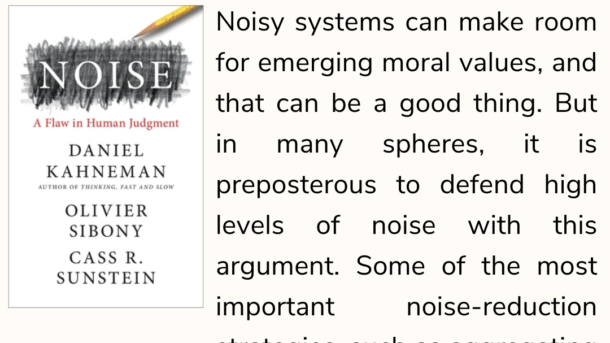In sum, some people might insist that an advantage of a noisy system is that it will allow people to accommodate new and emerging values. As values change, and if judges are allowed to exercise discretion, they might begin to give, for example, lower sentences to those convicted of drug offenses or higher sentences to those convicted of rape. We have emphasized that if some judges are lenient and others are not, then there will be a degree of unfairness; similarly situated people will be treated differently. But unfairness might be tolerated if it allows room for novel or emerging social values. The problem is hardly limited to the criminal justice system or even to law. With respect to any number of policies, companies might decide to allow some flexibility in their judgments and decisions, even if doing so produces noise, because flexibility ensures that as new beliefs and values arise, they can change policies over time. We offer a personal example: when one of us joined a large consulting firm some years ago, the not-so-recent welcome pack he received specified the travel expenses for which he was allowed to claim reimbursement (“one phone call home on safe arrival; a pressing charge for a suit; tips for bellboys”). The rules were noise-free but clearly outdated (and sexist). They were soon replaced with standards that can evolve with the times. For example, expenses must now be “proper and reasonable.” The first answer to this defense of noise is simple: Some noise-reduction strategies do not run into this objection at all. If people use a shared scale grounded in an outside view, they can respond to changing values over time. In any event, noise-reduction efforts need not and should not be permanent. If such efforts take the form of firm rules, those who make them should be willing to make changes over time. They might revisit them annually. They might decide that because of new values, new rules are essential. In the criminal justice system, the rule makers might reduce sentences for certain crimes and increase them for others. They might decriminalize some activity altogether—and criminalize an activity that had previously been considered perfectly acceptable. But let’s step back. Noisy systems can make room for emerging moral values, and that can be a good thing. But in many spheres, it is preposterous to defend high levels of noise with this argument. Some of the most important noise-reduction strategies, such as aggregating judgments, do allow for emerging values. And if different customers, complaining of a malfunctioning laptop, are treated differently by a computer company, the inconsistency is unlikely to be because of emerging values. If different people get different medical diagnoses, it is rarely because of new moral values. We can do a great deal to reduce noise or even eliminate it while still designing processes to allow values to evolve.
This will be the last excerpt shared from this book, and I think is a good summary of the overarching message of this book.
Humans, innovation and the development of new values are inherently messy. There remains an eternal conflict between existing legacy values and new ones. For us to truly accommodate new values, we do need a certain level of noise in our systems.
Nonetheless, this cannot be a defense against noise reduction, especially in sectors such as healthcare where the cost of inconsistency can be huge. Flexibility cannot be used as an excuse for inconsistency.



